The book was released in Great Britain on 20th November 2015 – it has been sold at bookstores across Poland since early October.
Magdalena Majewska, Polska.pl: Why did you decide to devote your new book to Anders’ Army?
Prof. Norman Davies*: The subject has been brewing in my head for about 50 years and I thought it was time to do something. But I also saw it as a good moment because there are a lot of memoirs by former Anders’ soldiers being published now. Apart from that, I had a chance to work with a very good photographer so we went ahead.
How did you work on the book? It is not only a story told by a historian but a collection of testimonies provided by those who actually made the journey. Was it difficult to gather those?
The book evolved, as often happens. To begin with I wrote quite a short text of about 100 pages, 20 chapters, 5-6 pages each. And I thought it would be enough. But then we realized that we could expand the book by including the memoirs. The memoirs are very systematic. There is one for every step of the Anders Army’s way. There is about a hundred solid extracts. I knew a lot of them already. I’ve been talking and reading about Anders’ Army for fifty years. The first memoir I ever read was by general Klemens Rudnicki whom I knew. I met him in London in the 1970s. He was a very sprightly elderly gentlemen. His memoirs are extremely exciting. Rudnicki was very interested in all sorts of things, not just military matters. He was interested in the countries they passed through, in the history of Uzbekistan – it was my first introduction to the soviet history of Uzbekistan and Kazakhstan. Rudnicki was very prominent in the organization of the part of the Anders Army in Uzbekistan. He was the last officer to leave.
A second memoir that made a big impression on me was written by a friend of ours in Oxford who is now nearly 90, Michał Giedroyć. He is the cousin of Jerzy Giedroyć editor of “Kultura” [ed. – a leading Polish-émigré literary-political magazine, published from 1947 to 2000 initially in Rome, and later in Paris]. Michał Giedroyć was deported with his mother when he was 11 so he was big enough to remember a number of things. And 60 years later he wrote this very detailed account of their life in Kazakhstan, the whole odyssey through Iran. He was a junak, or a cadet, in the cadet school in Palestine. He came to England at the age of 18 in 1947.
And the third memoir that sticks in my mind is by Aleksander Topolski. He died very recently. He lived to be nearly 100 years old. He was a bit older than Giedroyć then. He served in the communication corps of the army. He was very good at German. His job was to listen to German radio, read German publications, translate German propaganda, so he was very well informed. But he was a very lively, funny young man. I’m sorry that he died before I could meet him. We have been in touch with his widow who is an English lady. He was a great character.
Full interview you can read on: Polska.pl – Army from the lost world


